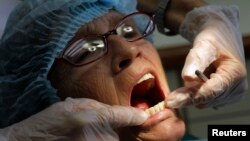Cavities in teeth may someday be repaired using laser therapy. U.S. researchers are using the technology to regrow the tissue inside damaged teeth.
Since the 1960's, physicians have used laser therapy to repair damaged tissue and destroy unwanted cells. Lasers can be tuned to different wavelengths to remove plaque from coronary arteries, to seal off leaky blood vessels in the eyes of people with diabetes to preserve sight, and to reattach retinas, the light sensing structure in the back of the eye.
Now, Harvard University researchers are using low-power lasers to repair teeth.
A bioengineer at the school’s Wyss Institute, David Mooney, says scientists aimed laser light for a few minutes on damaged teeth in rats.
“We drill through, create [ing] this tooth defect and then we shine a laser onto the defect and onto the soft tissues that lies underneath the defect, and then then we place a temporary filling over that to provide some mechanical protection," said Mooney.
After about 12 weeks, researchers removed the temporary filling and used x-rays to reveal the growth of new bone-like tissue called dentin. The laser light stimulated the regeneration by activating biologically dormant molecules called growth factors.
Doctors have used low-level light therapy to activate a number of biological processes, including hair growth and skin repair, without knowing how it worked. In an article in Science Translational Medicine, the Harvard researchers identify transforming growth factor beta-1 as the regenerative protein.
Mooney says it is unlikely that whole teeth could be regrown with laser therapy. But he sees two main applications - growing new dentin for people whose teeth are sensitive to hot and cold food and drink, and as an alternative to a root canal. In that procedure, all of the soft tissue inside the tooth is removed to repair decay or damage to the tooth.
“So you could replace the lost dentin with reparative dentin and hopefully then maintain the overall health of the tooth. That is one application [where] we see this could be useful in," he said.
Having shown that the treatment is effective in rats, researchers are now planning clinical trials to see whether tooth regeneration can work in humans.
Since the 1960's, physicians have used laser therapy to repair damaged tissue and destroy unwanted cells. Lasers can be tuned to different wavelengths to remove plaque from coronary arteries, to seal off leaky blood vessels in the eyes of people with diabetes to preserve sight, and to reattach retinas, the light sensing structure in the back of the eye.
Now, Harvard University researchers are using low-power lasers to repair teeth.
A bioengineer at the school’s Wyss Institute, David Mooney, says scientists aimed laser light for a few minutes on damaged teeth in rats.
“We drill through, create [ing] this tooth defect and then we shine a laser onto the defect and onto the soft tissues that lies underneath the defect, and then then we place a temporary filling over that to provide some mechanical protection," said Mooney.
After about 12 weeks, researchers removed the temporary filling and used x-rays to reveal the growth of new bone-like tissue called dentin. The laser light stimulated the regeneration by activating biologically dormant molecules called growth factors.
Doctors have used low-level light therapy to activate a number of biological processes, including hair growth and skin repair, without knowing how it worked. In an article in Science Translational Medicine, the Harvard researchers identify transforming growth factor beta-1 as the regenerative protein.
Mooney says it is unlikely that whole teeth could be regrown with laser therapy. But he sees two main applications - growing new dentin for people whose teeth are sensitive to hot and cold food and drink, and as an alternative to a root canal. In that procedure, all of the soft tissue inside the tooth is removed to repair decay or damage to the tooth.
“So you could replace the lost dentin with reparative dentin and hopefully then maintain the overall health of the tooth. That is one application [where] we see this could be useful in," he said.
Having shown that the treatment is effective in rats, researchers are now planning clinical trials to see whether tooth regeneration can work in humans.




